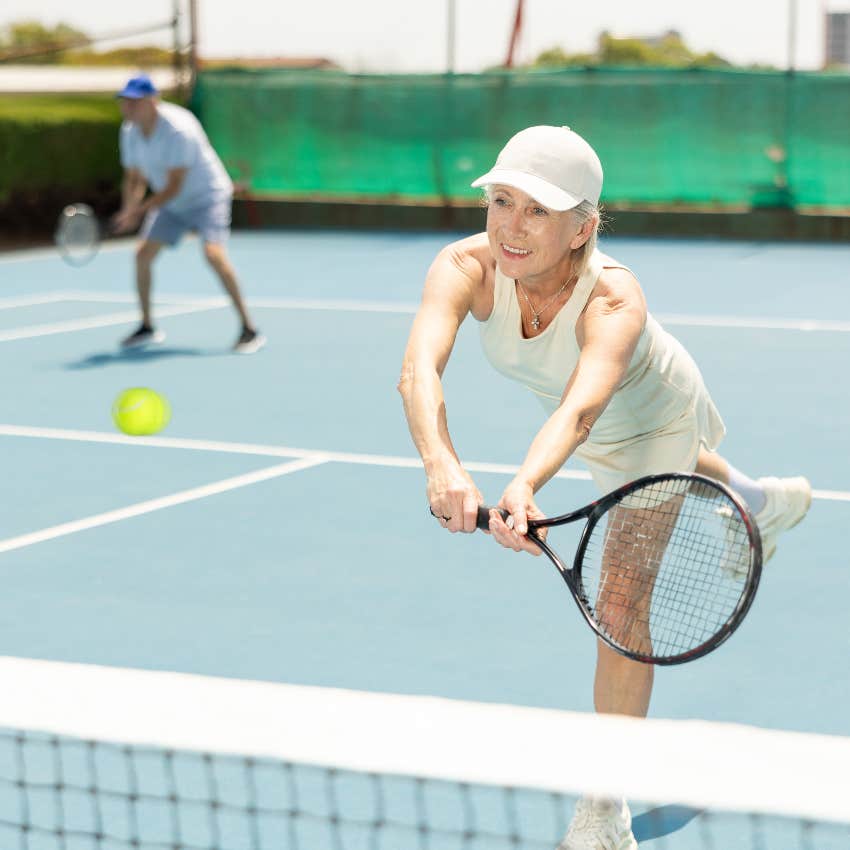Brain Doctor Reveals That People Who Have This One Specific Hobby Tend To Live Longer Than Everyone Else
Maybe it's become such a huge trend for a reason.
 Jacob Lund | Shutterstock
Jacob Lund | Shutterstock Nowadays, most of us are trying to do all we can to live the longest, healthiest lives possible and unlock the keys to longevity.
According to a double board-certified psychiatrist, one of those keys might not be related to our diets, supplements, or any of the other things we're often told to focus on, but rather how we spend our free time.
The brain doctor revealed that people who play racquet sports tend to live longer than everyone else.
Pickleball, a sort of magnified version of ping-pong — or shrunk-down version of tennis, if you like — has been everywhere in recent years. If you have boomer parents or grandparents, you've probably heard all about it.
The game is beloved by the elderly, and pickleball courts are fast becoming standard in retirement communities all over the country.
Well, it turns out it might not be just a passing fad. It seems that a love of racquet sports, from tennis and racquetball to, yes, pickleball — and even badminton — is highly correlated with longevity.
In a podcast, psychiatrist Dr. Daniel Amen explained the fascinating reasons why racquet sports seem to have so many health benefits and why we all might want to make a trip down to the pickleball court sometime soon.
Amen explained that racquet sports are uniquely stimulating to several different parts of the brain.
"People who play racquet sports live longer than everybody else," Amen explained on the podcast. He cited multiple studies of tens of thousands of people — one such study observed more than 80,000 subjects — which have shown replicable results.
What it seems to all come down to is the multifaceted stimulation racquet sports provide to the brain, especially because of the coordination they require. "It activates your cerebellum — your little brain" at the back of your head, Amen explained.
That part of the brain is only 10% of its volume but contains "half the brain's neurons," Amen went on to say. "If you activate that, it turns on the rest of your brain," he explained, so the stimulation and positive effects spread to other parts of the brain and nervous system.
The podcast host admitted that he is daunted by these sports because "anything involving eye-hand coordination, I'm terrible at." But Amen urged people who feel similarly to not judge themselves, and just do a racquet sport for the benefit of it.
"[You] don't have to beat people," he said. "If you spend a half hour twice a week, it'll have a major impact on your ability to think because you got to get your eyes, hands, and feet all working together while you think about the spin on the ball."
Keeping the brain and body actively working together in old age has been proven to have beneficial effects on everything from cognition to bone and muscle density to cardiovascular health, so Amen is definitely onto something.
 BearFotos | Shutterstock
BearFotos | Shutterstock
Scientists also say that the social aspects of racquet sports have major benefits. Unfortunately, they are also correlated with wealth.
Psychologist Art Kramer, who is the director of Northeastern University's Center for Cognitive and Brain Health, says that he has a hunch that the benefits of racquet sports when it comes to longevity go beyond merely brain stimulation. "It's also very social, right?," he told Northeastern Global News, the university's news outlet.
"If there is a connection between racquet sports and somewhat better levels of mortality and perhaps brain health," he went on to say, "that might be due to the fact that it’s not simply exercise, it’s exercise with others — and social interaction has been found to have benefits for cognitive and brain health."
In a country gripped by a loneliness epidemic that is hugely impacting senior citizens, that's no small benefit.
But can it really be said that racquet sports are some kind of panacea? People on TikTok were skeptical because Amen's analysis, and the studies themselves, leave out one major variable. As one commenter put it, "People who play tennis also usually have more money."
Kramer himself warned against sweeping declarations like Amen's about racquet sports being the key to long life. Referencing one of the studies, he said, "It was an observational study, which means that we cannot establish a causal relationship between playing racquet sports and a longer life."
That's not to say that wealth is the linchpin either, but it's certainly a salient detail — you have to have money for things like equipment, lessons, and time on a tennis or racquetball court, which are resources to which pretty much only the affluent have access.
Still, there's no denying that racquet sports have benefits. The key to a long life? The jury's still out. But a major source of positive impacts on both the neurological and emotional brain? You bet, and those benefits will go a long, long way.
John Sundholm is a news and entertainment writer who covers pop culture, social justice, and human interest topics.

